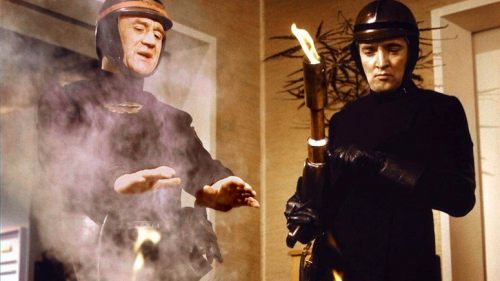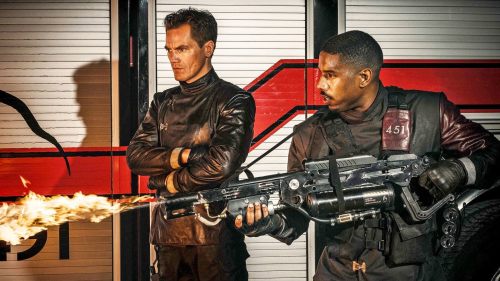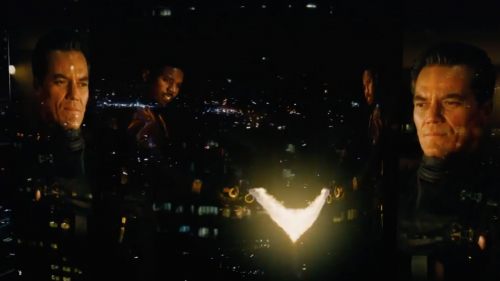FAHRENHEIT 451 Review: Burnin’ Down The (White) House
A fire engine is reassurance on wheels. The lights and sounds of a fire truck provide us with comfort because we know help is on the way. The genius of Ray Bradbury’s dystopian novel Fahrenheit 451 is how it takes our faith in the fire department as a trusted institution and makes it sinister. Firemen in Fahrenheit 451 burn books; the sound of a siren approaching means one thing: run. Public utilities that used to protect people are now used as a tool of oppression. HBO Film’s adaptation of Fahrenheit 451, written and directed by Ramin Bahrani (99 Homes), captures the horrors of an American society where censorship is used to sedate free thinking and it’s contrasted perfectly with 2018’s social and political anxieties.
In the distant future, books are banned by the U.S. government. A fireman, Guy Montag (Michael B. Jordan), and his Captain (Michael Shannon) lead the best fire crew in America and are experts at turning literature to ash. Montag is committed to the cause until he uncovers a huge library and begins to question the motives of the government.
The timing of the release of Fahrenheit 451 is perfect. Like Hulu’s adaptation of The Handmaid's Tale, America in 2018 is on the precipice of what was envisioned in these dystopian novels; it’s hard not to see the parallels and feel a sense of dread at sitting so uncomfortably close. The battle cry for the firemen is “time to burn for America again”, which sounds eerily similar to what’s embroiled on President Donald Trump’s favourite red hat.
Context is key to making 2018’s Fahrenheit 451 work. The themes of Bradbury’s novel are evergreen so it’s a question of why now? Bahrani contextualises the plot to factor in the political climate of 2018 and give the story urgency. There are allegories at play that align with the dangers of ‘fake news’, analytic companies suspect use of Facebook data to target users with false information and the dwindling size of newsrooms. Journalism is mentioned like a barbaric act from the dark ages. Just the amount of video present in Fahrenheit 451 made my stomach churn at the thought of how many media companies are making the decision to ‘pivot to video’ and cut their writing staff.
Bahrani effectively establishes the laws and social structures of Fahrenheit 451 to make you buy into the reality of this world. The aesthetic of the technology and how it’s integrated into American life is similar to digital nightmare of Black Mirror. A form of social media is ever present and citizens are under constant surveillance. Montag is like an Instagram influencer with a flamethrower whose book burning activity is broadcast on the sides of skyscrapers while people react with emojis – the only way people are allowed to express themselves since writing is outlawed. There’s a chilling scene where the firemen are doing a demonstration at a school and they tell the kids there are books available to read: The Bible and Moby Dick. A screen shows the both texts summarised in emojis about the length of a tweet. The kids cheer while Montag hits books with fireballs. Bahrani makes the squad look like the fighter pilots in Top Gun and they share a macho comradery. Masculinity is used to keep these guys ignorant and committed to the cause. The horror sets in when you realise the kids are not only being indoctrinated, they are being recruited. You come out this sequence understanding how this society functions, you may even feel a little brainwashed, a credit to Bahrani’s ability to sell this world as a practical possibility.
The dictum of Fahrenheit 451’s society is: Happiness is truth, freedom is choice, self is strength. The firemen burn for happiness. Discourse is the enemy and ignorance is bliss. The modern themes continue to resonate when the Chief speaks about why all art must burn: “We must be made equal by fire.” It’s not only free and critical thinking that’s a danger to society but the need to eliminate anything that offends people. Bahrani references outrage culture and the extremities of being aggressively woke or conservative; it’s like when people label an older film, television show or book as offensive when it’s not judged within the proper context of the time it was created. Nothing exists in a vacuum but it’s always easy to take the high road if you judge anything by modern standards. Yet, social media and the internet make us haphazardly reactive in the quest for clicks, followers and validation. It’s much easier to be offended than to engage with something and asses it critically. In Fahrenheit 451 outrage culture has been weaponised to deem all literature an enemy of the state in order to maintain an inoffensive equilibrium. Our worse impulses as an audience are used against us.
The core dynamic of Fahrenheit 451 is the relationship between Montag and the Chief. Shannon delivers another authoritative performance but feels a little on auto-pilot. Jordan is dynamite, once again, channelling the hyper masculine Montag in fireman mode who is slowing cracking each time he encounters artistic contraband. The goal of Fahrenheit 451’s society is happiness but the by-product is numbness. Like most dystopias, the people in power are hypocrites because they all keep a stash of contraband, which effects them in different ways. In order to survive it’s all about seeing how close you can get to what’s dangerous without showing weakness. There’s a scene where Bahrani frames Montag holding a match for as long as he can while it burns, which evokes the match holding scene in Lawrence of Arabia: “The trick, William Potter, is not minding that it hurts.” The enlightenment of Montag is a slow burn but it’s rushed toward the finale in favour of absolving the plot and detailing a tragic backstory to justify his actions. The execution becomes a tad dull once there is signs of a rebellion. There’s no sense of tension or momentum. Montag’s newfound virtue never feels like a seismic shift in his moral compass.
Fahrenheit 451 is more about the shock of a book burning dystopia than anything else at play in the film. It’s a slick adaptation but a little mundane in scope. Despite the potent ideas at play it’s designed for when you’ve forgotten to read the novel the night before their book report is due.
Ramin Bahrani's Fahrenheit 451 hits HBO on May 19th.



